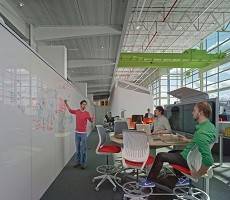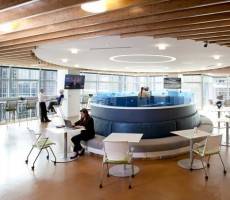October 24, 2014
No natural light in almost half of European offices, finds report
Almost half (42%) of European office employees have no natural light in their working environment, over half (55%) don’t have access to any greenery and 7 per cent have no window in their workspace. Yet according to the findings of The Human Spaces Report, commissioned by Interface and led by Organisational Psychologist Professor Sir Cary Cooper, European employees who work in environments with natural elements report a 13 per cent higher level of well-being and are 8 per cent more productive overall. With nearly two-thirds (63%) of EMEA office workers now based in either a town or city centre and spending on average 34 hours per week in the office, their interaction with nature is becoming increasingly limited. Yet despite city dominated lives, the research found workers have an inherent affinity to elements that reflect nature. Flexible working was a surprisingly low preference, with just 11 per cent of workers choosing a space that suits their needs as their productive way to work.. (more…)
























October 21, 2014
Orgatec preview: the next generation workplace is all about settings
by Justin Miller • Comment, Events, Products, Workplace design
There is a well travelled international circuit for those interested in what office design tells us about the way we work that has, for a number of years, taken in London, Milan, Chicago, Stockholm and Cologne as its main stopping off points. This week sees the launch of Orgatec, the longstanding biennial workplace festival in Cologne. One of the interesting features of Orgatec is that, because it takes place every two years, it offers snapshots of key developments in the market. It throws a spotlight on whatever workplace professionals are talking about and whatever product designers are doing in response to the changing world of work. And it does it on a big scale. This year over 600 companies from 40 countries will be presenting across an exhibition area of 105,000 sq. m. This seems big, and is, but is down markedly on the size of the show from 20 years ago when Orgatec was the launch pad for seminal products such as Herman Miller’s Aeron Chair and the Ad Hoc furniture system from Vitra.
(more…)